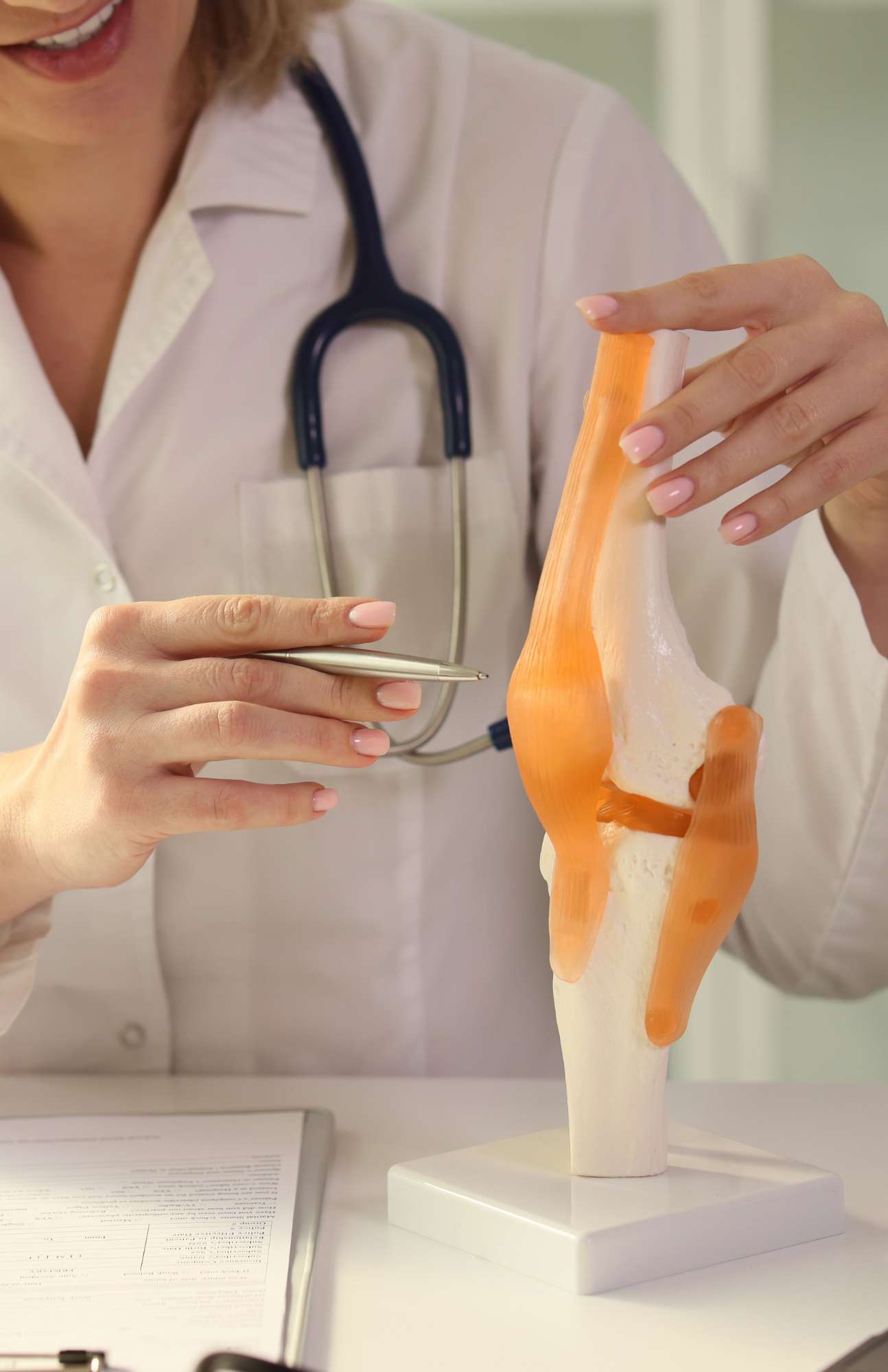Know When to See an Orthopedic Doctor for Knee Pain
Knee pain is a common issue that affects people of all ages and walks of life. Whether it’s due to injury, overuse, or a chronic condition, dealing with knee pain can be debilitating and impact your quality of life. And, knowing when to see an orthopedic doctor for knee pain is crucial!
As someone who has personally experienced the challenges of knee pain, I understand the importance of seeking timely medical assistance and finding the right orthopedic doctor for effective treatment.
In this comprehensive guide, I will delve into the various aspects of knee pain, its causes, signs that indicate the need for an orthopedic evaluation, common knee conditions requiring orthopedic intervention, evaluation and diagnosis by an orthopedic doctor, treatment options, rehabilitation, preventive measures, and finding the right orthopedic doctor for your specific needs.
Table of Contents
Understanding Knee Pain and Its Causes
The knee is a complex joint that plays a crucial role in supporting our body weight and facilitating movement. Knee pain can originate from a wide range of factors, including acute injuries, chronic conditions, overuse, or underlying health issues.
Common causes of knee pain include ligament injuries, a meniscus tear, osteoarthritis, rheumatoid arthritis, patellar tendinitis, bursitis, and dislocation. Other related common conditions include sciatica and knee pain along with plantar fasciitis and knee pain.
Additionally, factors such as age, obesity, poor posture, and improper biomechanics can contribute to the development of knee pain. Understanding the root cause of your knee pain is essential for determining the most effective treatment approach and seeking the appropriate medical assistance.
When experiencing knee joint pain, it’s crucial to pay attention to the specific symptoms and triggers that accompany it. Whether it’s sudden sharp pain, persistent aching, swelling, stiffness, or limited range of motion, these signs can provide valuable insights into the underlying issue. It’s also worth mentioning that cold weather can play a role in knee pain!
Moreover, identifying the activities or movements that exacerbate the pain, such as walking, climbing stairs, or bearing weight, can help in pinpointing the cause of the discomfort.
By keeping track of these details, you can better determine when to see an orthopedic doctor for knee pain, enabling them to make an accurate diagnosis and formulate a targeted treatment plan.

Signs of when to see an orthopedic doctor for knee pain
While some instances of knee pain can be managed with rest, ice, and over-the-counter pain medications, certain signs and symptoms warrant a prompt evaluation by an orthopedic specialist.
If you experience severe pain that limits your ability to bear weight on the affected knee, significant swelling or bruising, or a popping or locking sensation, it’s essential to know when to see an orthopedic doctor for knee pain without delay.
Additionally, if the pain persists for an extended period, interferes with daily activities, or is accompanied by a feeling of instability in the knee joint, these are red flags that necessitate a thorough orthopedic assessment.
In some cases, knee pain may be indicative of an underlying condition that requires specialized care, such as a torn ligament, cartilage damage, or degenerative joint disease. Ignoring persistent or worsening knee pain can lead to further damage and complications, making it imperative to consult an orthopedic doctor for a comprehensive evaluation.
By knowing when to see an orthopedic doctor for knee pain and addressing the issue early on, you can prevent the progression of the condition and explore appropriate treatment options tailored to your specific needs.
Importance of Seeking Timely Medical Assistance
Seeking timely medical assistance for knee pain is crucial for several reasons. First and foremost, early intervention can prevent the worsening of the condition and minimize the risk of long-term disability or chronic pain.
By consulting an orthopedic doctor at the onset of symptoms, you can receive timely diagnosis, personalized treatment, and guidance on managing the issue effectively.
Furthermore, addressing knee pain promptly can help you regain mobility, improve your overall quality of life, and prevent the need for invasive interventions in the future.
Moreover, delaying or neglecting to seek immediate medical attention for knee pain can lead to prolonged discomfort, functional limitations, and psychological distress. The impact of persistent knee pain on one’s physical and emotional well-being should not be underestimated, and addressing the issue proactively can alleviate these challenges.
Whether it’s through conservative measures, minimally invasive procedures, or surgical intervention, knowing when to see an orthopedic doctor for knee pain can set you on the path to recovery and long-term knee health.

Common Knee Conditions That Require Orthopedic Intervention
Several common knee conditions necessitate the expertise of an orthopedic knee specialist for comprehensive evaluation and treatment. These conditions encompass a wide spectrum, ranging from acute knee injuries to degenerative joint diseases, each requiring a tailored approach for effective management.
Ligament injuries, such as anterior cruciate ligament (ACL) tears, and meniscus tears are frequent occurrences, often stemming from sports-related activities or sudden twisting motions.
Osteoarthritis, characterized by the gradual breakdown of joint cartilage, is another common problem that can lead to chronic knee pain and stiffness.
Rheumatoid arthritis, an autoimmune disorder affecting the joints, can also manifest in the knees, causing inflammation and discomfort.
Patellar tendinitis, commonly known as jumper’s knee, involves the irritation or inflammation of the patellar tendon and typically affects athletes engaged in jumping sports.
Additionally, bursitis, an inflammation of the small fluid-filled sacs around the knee joint, can result in localized pain and swelling.
Understanding the nature of these conditions and their impact on your knee health is essential for making informed decisions about when to see an orthopedic doctor for knee pain.
Evaluation and Diagnosis by an Orthopedic Doctor
When you visit an orthopedic doctor for knee pain, they will conduct a thorough evaluation to assess the underlying cause of your symptoms. This typically involves a comprehensive medical history review, physical examination, and diagnostic tests to obtain a clear understanding of your condition.
During the physical examination, the orthopedic doctor will assess your knee’s range of motion, stability, and signs of inflammation or structural abnormalities. They may also utilize imaging studies, such as X-rays, MRI scans, or ultrasound, to visualize the internal structures of the knee joint and identify any damage or abnormalities.
Based on the findings from the evaluation, the orthopedic doctor will formulate a precise diagnosis and discuss the available treatment options with you. The diagnostic process is crucial for determining the most appropriate course of action, whether it involves conservative measures, such as physical therapy and medication, or more advanced interventions, such as arthroscopic surgery or joint replacement.
By keeping the lines of communication open with your orthopedic doctor and actively participating in the diagnostic process, you can gain valuable insights into your condition and collaborate on developing a tailored treatment plan.

Treatment Options for Knee Pain Offered by Orthopedic Specialists
Orthopedic specialists offer a wide array of treatment options for addressing knee pain and restoring optimal function. The choice of treatment depends on the specific nature of the condition, its severity, and the individual’s overall health and lifestyle.
Conservative treatment, including rest, ice, compression, and elevation (RICE protocol), along with nonsteroidal anti-inflammatory drugs (NSAIDs) and physical therapy, are often the first-line approach for managing a minor injury with mild to moderate knee pain.
Physical therapy plays a crucial role in strengthening the muscles around the knee, improving flexibility, and enhancing joint stability.
For more complex or persistent cases of knee pain, an orthopedic physician may recommend minimally invasive procedures, such as corticosteroid injections to alleviate inflammation or arthroscopic surgery to address meniscus tears or ligament injuries.
In cases of advanced degenerative conditions, joint preservation procedures, such as osteotomy, or joint replacement surgical treatments may be considered to restore function and alleviate pain.
Orthopedic specialists are equipped with the expertise and resources to provide comprehensive care and guide you through the decision-making process to determine the most suitable treatment modality for your specific condition.
Rehabilitation and Recovery After Orthopedic Treatment
Following orthopedic treatment for knee pain, rehabilitation plays a pivotal role in promoting healing, restoring function, and preventing recurrent issues. Rehabilitation programs are tailored to each individual’s needs and may encompass a combination of exercises, manual therapy, and functional training.
These programs focus on improving mobility, strength, and proprioception, thereby facilitating a safe and effective return to daily activities and sports, if applicable.
Engaging in rehabilitation under the guidance of an experienced healthcare provider is essential for maximizing the outcomes of orthopedic treatment and minimizing the risk of complications.
Recovery after orthopedic treatment involves a gradual progression of activities, adherence to prescribed rehabilitation protocols, and ongoing communication with your orthopedic doctor and physical therapists. It’s important to follow the recommended guidelines for post-treatment care, including activity modification, pain management strategies, and lifestyle adjustments.
By knowing when to see an orthopedic doctor for knee pain, actively participating in your recovery process and diligently adhering to the prescribed rehabilitation plan, you can optimize your outcomes and regain confidence in your knee’s strength and stability.
Additionally, maintaining open communication with your healthcare team and addressing any concerns or challenges that arise during the recovery phase is paramount for achieving long-term success.

Preventive Measures and Lifestyle Changes for Knee Health
Incorporating preventive measures and lifestyle changes is instrumental in maintaining optimal knee health and reducing the risk of future knee problems.
This encompasses adopting a balanced approach to physical activity, incorporating low-impact exercises, such as swimming or cycling, to minimize stress on the knees while promoting cardiovascular fitness and muscular endurance.
Maintaining a healthy body weight through a nutritious diet and regular exercise can alleviate excess strain on the knees and reduce the risk of developing conditions such as osteoarthritis or a sports injury.
Additionally, implementing proper warm-up and cool-down routines, wearing supportive footwear for knee discomfort, and practicing proper biomechanics during physical activities can mitigate the risk of a knee injury and strain on the knee joints.
Furthermore, engaging in strength and flexibility training to enhance the stability and resilience of the knee joint is beneficial for preventing musculoskeletal imbalances and reducing the likelihood of injuries.
It’s essential to listen to your body, avoid overexertion, and know when to see an orthopedic doctor for knee pain when starting new physical activities or sports.
By prioritizing preventive measures and lifestyle modifications, you can proactively safeguard your knee health and minimize the need for extensive orthopedic interventions in the future.
Finding the Right Orthopedic Doctor for Your Knee Pain
Knowing when to see an orthopedic doctor for knee pain and selecting the right orthopedic doctor for your knee pain is a critical step in receiving personalized, expert care. When seeking an orthopedic specialist, consider factors such as their experience, expertise in treating knee conditions, and the range of treatment options they offer.
Researching the orthopedic doctor’s credentials, patient reviews, and success stories can provide valuable insights into their capabilities and patient-centered approach.
Additionally, seeking recommendations from trusted sources, such as your primary care physician, friends, or family members, can guide you towards reputable orthopedic specialists in your area.
Another essential aspect to consider is the communication style and collaborative approach of the orthopedic doctor. A doctor who listens attentively, explains the diagnosis and treatment options clearly, and involves you in the decision-making process can significantly enhance your experience and outcomes.
Moreover, assessing the accessibility and convenience of the orthopedic practice, including appointment availability, location, and support services, can contribute to a seamless and efficient healthcare journey.
By investing time and effort into finding the right orthopedic doctor, you can embark on a path towards effective treatment, personalized care, and long-term knee health.

Conclusion
In conclusion, knowing when to see an orthopedic doctor for knee pain is pivotal for addressing the underlying issues, obtaining a precise diagnosis, and exploring tailored treatment options. By understanding the causes of knee pain, recognizing the signs that warrant orthopedic evaluation, and seeking timely medical assistance, you can take proactive steps towards regaining mobility and alleviating discomfort.
With the expertise of orthopedic specialists, comprehensive evaluation and diagnosis, diverse treatment options, and dedicated rehabilitation, you can navigate through the challenges of knee pain with confidence and resilience. Embracing preventive measures, lifestyle changes, and finding the right orthopedic doctor further empowers you to prioritize your knee health and well-being.
If you are experiencing persistent knee pain or have concerns about your knee health, I encourage you to reach out to a reputable orthopedic doctor for a thorough evaluation and personalized care. By taking proactive steps towards addressing your knee pain, you can embark on a journey towards improved mobility, enhanced well-being, and a fulfilling, active lifestyle.
This comprehensive overview serves as a guide for individuals navigating the challenges of knee pain and seeking the expertise of orthopedic specialists for optimal care. With a proactive approach to knee health and the support of dedicated healthcare professionals, you can embark on a journey towards enhanced well-being and sustained mobility.







2 Comments
Comments are closed.